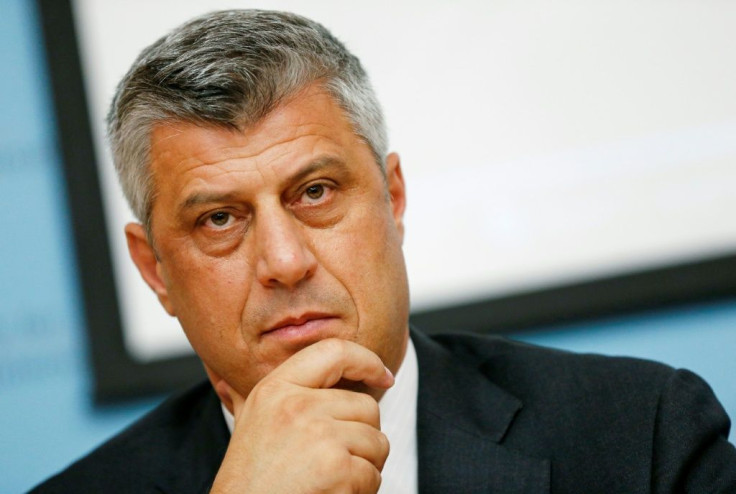Kosovo President Charged With War Crimes Over 1990s Killings
Kosovo President Hashim Thaci has been charged with 10 counts of war crimes and crimes against humanity for his role in the country's conflict in the 1990s, a tribunal in The Hague said on Wednesday.
Wartime intelligence chief and former parliamentary speaker Kadri Veseli is also accused of war crimes by specialist prosecutors before the Kosovo Specialist Chambers.
Veseli has denied the accusations.
The charges against both men were brought on April 24 but not revealed publicly at the time, prosecutors said in a statement.
"The indictment alleges that Hashim Thaci, Kadri Veseli and the other charged suspects are criminally responsible for nearly 100 murders," the statement added.
The accused are also facing other charges such as enforced disappearance of persons, persecution and torture.
The crimes alleged in the indictment "involved hundreds of known victims of Kosovo Albanian, Serb, Roma, and other ethnicities and include political opponents".
Prosecutors said they decided to make the accusations public because Thaci and Veseli had made "repeated attempts" to obstruct the KSC.
The charges will now be put before a pre-trial judge at the KSC for a decision to confirm them, the prosecutors said.
Thaci was preparing for a summit at the White House on Saturday with Serbian counterpart Aleksandar Vucic and local media reports suggested he had already left for the US.
But US special envoy to Serbia and Kosovo Richard Grenell, who organised the White House meeting, said in a tweet that Thaci had cancelled going to the summit following the charges in The Hague.
"I respect his decision not to attend the discussions until the legal issues of those allegations are settled," Grenell said. Talks will now go ahead with Kosovo's new Prime Minister Avdullah Hoti, who has moved to ease friction with Serbia.
Thaci's office did not specify his whereabouts.
But before the charges were announced he gave an interview in Albanian capital Tirana and was headed from there to Frankfurt, the journalist who interviewed him told AFP.
The EU-backed tribunal was established in 2015 to investigate crimes by independence-seeking ethnic Albanian guerrillas against mainly Serb civilians during the 1998-1999 war.

The conflict pitted Kosovo Liberation Army guerrillas seeking independence for the southern Serbian province of Kosovo against Serbia's forces, who withdrew from the territory after an 11-week NATO bombing campaign.
The tribunal was created after a Council of Europe report tied former guerrilla leaders, including Thaci, to atrocities.
The court announced earlier this year that it had handed down its first indictments against high-ranking Kosovo officials without naming them, but speculation was already rife that it included Thaci.
Asked in April whether he would resign if he was charged, Thaci told local media he was not even thinking about it and would "respond positively" if he was asked to appear at the tribunal.
News of the indictment was met with caution by many in Pristina.
"This court, if it works properly, will clean up the KLA's war (record), because it is extremely certain that no KLA soldier who has worn the uniform has committed crimes against Serb civilians," Skender Musa, a lawyer told AFP.
These are "very serious indictments. I hope they are not true and we will prove our clean war," added Ermal Emini, an economist.
Kosovo's ex-prime minister, Ramush Haradinaj, resigned last July after being summoned by the prosecutor for interrogation as a suspect.
Veseli said in November he had been summoned by the court to be questioned.
"The allegations raised are completely untrue and do not hold. There is also no basis for the accusations that we were impeding the work of the court," Veseli said in Pristina.
The KSC opened its doors in The Hague as the International Criminal Tribunal for the former Yugoslavia (ICTY) was winding down after almost 25 years of prosecuting crimes committed in the Balkans after Yugoslavia's break-up in the early 1990s.
Haradinaj was acquitted of war crimes by the ICTY in 2012.
Kosovo's independence war claimed around 13,000 lives, the majority of whom were ethnic Albanians.
The territory unilaterally declared its independence in 2008 with backing from the United States and most of the West.
But Serbia and its allies China and Russia have never accepted the move, and the status of Kosovo remains a major source of tension in the Balkans.
© Copyright AFP 2024. All rights reserved.




















